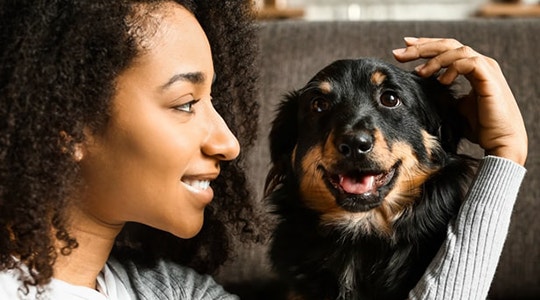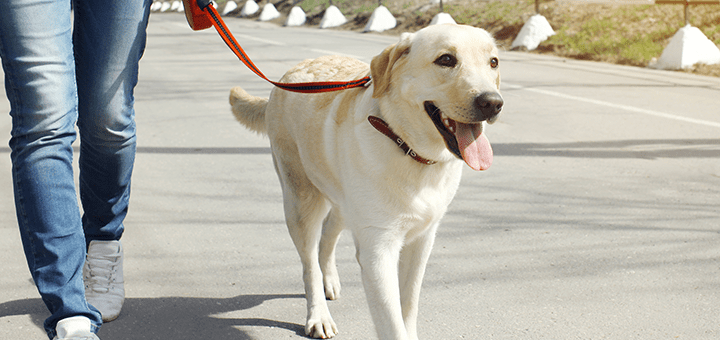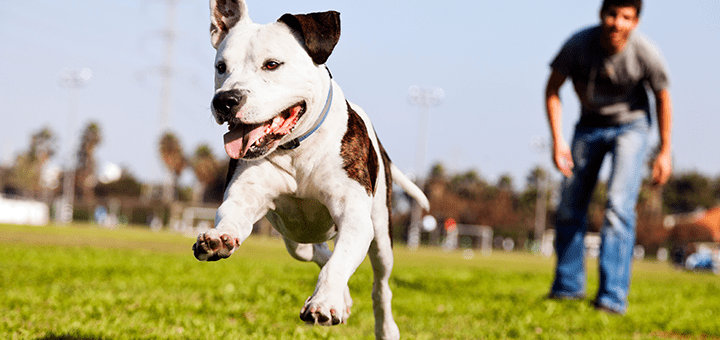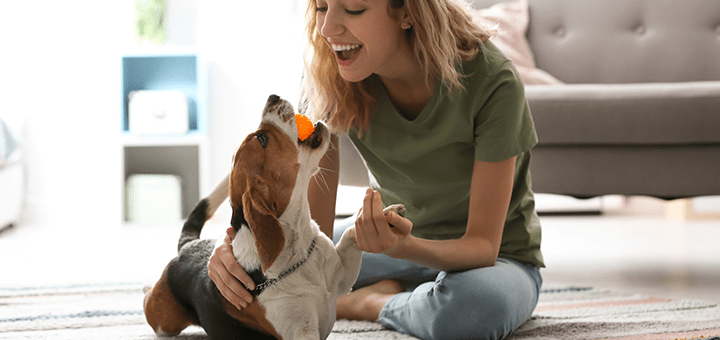
5 Important Questions to Consider Before Adopting a Dog
There are a lot of reasons to consider adopting a dog, including the proven fact that owning a dog is healthy (opens in new window) ! Bringing a new dog home also sounds like a lot of fun: long walks around the neighborhood, playtime excitement, and cuddles on the couch. No matter how exciting adopting a dog can be, it’s also a major commitment. After all, you’ll be responsible for their health and well-being through every future stage of your dog's life (opens in new window) .
Whether you plan to adopt a puppy from the shelter or a senior dog from a local foster family, it’s important to understand the commitment. Not only will you be deciding what pup may be a good fit for you – you must consider if you are a good fit for a dog, too. Although developing a plan is not always as fun (or cute!) as looking for a new best friend, it will be worth it in the long run. Here’s what you should think over:
What to Consider Before Adopting a Dog
Ask yourself: Do you really want a dog?
Do you want to wake up early on a cozy Sunday morning to take them out in the rain? Are you ready to spend as much time as you can with them? What kind of dog will fit best into your home? Do you plan to travel often? These details may seem small, but they are the building blocks to a rewarding adoption process and finding the perfect pup for you.
If it feels overwhelming to consider all the details, don’t fret! We’ve provided these 5 important questions to ask before you start looking – if you review these questions and still feel confident, you may be a good fit to adopt or foster! The next steps? Check out our Ultimate Guide to Adopting a Dog (opens in new window) to lead you through the adoption process from start to finish.

1. Is Now the Best Time for You to Adopt a Dog?
For a dog waiting for their 'forever home,” it's always a good time to be adopted. But don't let them down by bringing them home and then deciding it's simply not the right time for you. Dogs take lots of care and attention, especially when they first come home.
Consider your schedule now and far into the future – do you have the flexibility to tend to a potentially anxious dog in the first few weeks at home? Do you have the patience to potty train a puppy or clean up any accidents? Will you have time to exercise them daily? Prepare to be flexible and spend lots of time with your new dog, especially in the first few months. Even if your dog is adapting well, they will still want lots of love and attention as they adjust to their new home. This time is essential in building trust and familiarity between you and your dog.
Do you plan to move in the future? Travel a lot in the years to come? Will you make any major financial commitments or expand your family? Adopting a dog is a long-term commitment, which may mean adjusting your future plans. If you have upcoming life events that may get in the way of your ability to care for a dog right now, wait until you can provide them with a stable, consistent environment. Although no one can predict the future, being thorough in your considerations will help prevent you from overcommitting.
2. Are You Ready for the Responsibility and Commitment ?
Consider the emotional and physical commitment that comes with adopting a dog. What may need to change in your life once you get a dog? Why would you be a good companion for a pup? Remember, not only will you need to find a good fit for you – you will need to be a good fit for your dog. They will rely on you for attention, care, survival and safety. This could mean meeting their exercise needs even when you’re feeling lazy or leaving a party early to let them out for a potty break. Whether your dog prefers long runs (opens in new window) or long naps (or both!), they will rely on you to meet their needs. Dogs are loyal and devoted companions, so be sure you can provide your new pup with similar commitment. Part of adopting a dog is knowing it may not always be easy, but in exchange, you get a loyal and loving companion for years to come.

3. What Breed of Dog Will Be a Good Fit for You?
First, it helps to have an understanding of what attributes you want in a dog, and then finding a breed that matches (opens in new window) . Think about your ideal dog’s characteristics: are they a couch potato or lover of long distance runs? Are they a gentle giant or protective lap dog? Do you want an energetic, growing pup or mellow, experienced companion?
Understand what age, temperament, exercise goals, interest and training needs you want to see in your future pup. Then, you can begin to look for breeds that match those characteristics.
And don’t forget about mixed breeds dogs! They can have the perfect blend of several breeds to match what you’re searching for. You can still consider particular breeds of dogs, even when adopting from a shelter. But many shelter dogs aren’t purebred. Shelter and rescue workers often make very educated guesses at the lineage of their adoptable dogs (opens in new window) , but a dog’s breed doesn’t always determine their exact characteristics, either. Breed usually gives us an opportunity to best predict what a dog may look and act like, but it isn’t a one-size-fits-all categorization. That’s why it’s helpful to know the characteristics you want, what breeds may match and then begin searching from there. Remember to keep an open mind, consider mixed breeds and observe any potential new best friends first to be sure they will fit in well with your goals.
4. Are You Ready to Budget for A New Dog?
Are you prepared to pay for the care and upkeep of a dog? The ongoing financial commitment of dog ownership can really add up. Besides the cost of quality dry dog food and dog treats (opens in new window) , there are toys, doggie beds and blankets; annual vet visits and medication costs ; medical emergencies and more. Be sure you can afford a dog — and all the expenses that come with them — before you bring home a new pet.
We recommend building a budget based on your location and lifestyle – costs of pet care vary depending on price of living, local resources and other optional expenses. For example, some pet parents choose to hire a professional for grooming, training, others choose to train their dog at homev. Similarly, some dogs may need more grooming or training attention than others. Consider how your lifestyle, future plans and financial stability will play a role in your readiness to commit.
Ask around your neighborhood or check online to determine what costs will look like for you. Are you financially prepared in case of an emergency? Will you, now or in the future, need to make major financial changes? Every dog will be different, so it’s impossible to perfectly forecast how much caring for them will cost. But being considerate of your finances and future expenses will bring you closer to understanding how ready you are for this commitment.

5. Is Your Situation Suited for Your Dog’s Needs?
Before you adopt, assess your situation and location to understand if, or what kind of, dog will fit in well. Your home is probably where your dog will spend a lot of their time, so make sure they can be comfortable there. It doesn't really matter how big or small your home is — as long as your dog gets plenty of exercise and attention.
Do you have children? If you have a landlord, do they have regulations on what size or breed of dog is allowed to live in your apartment? Do you have other pets or people you live with to consider in the decision process? Will your new furry friend need special protection from the cold winters or wild animals in your area?
Be sure your situation can provide a happy stable home for your pet.
The Benefits of Rescuing a Shelter Dog
Now that you have a better idea of what kind of dog is your perfect match, it’s time to head to a shelter to save a dog’s life.
Finding a Dog Shelter or Rescue That’s Right For Your
A rewarding aspect of shelter adoption is the lifelong loyalty and special bond (opens in new window) many owners develop with their rescued dog. Opening up your heart and home to a rescue usually results in an extremely strong relationship. That can mean a loyal, affectionate and attentive dog for life.
No matter what shelter you go to, you'll find lots of dogs in need of a good home. With a shelter adoption, you're saving more than one life; you're making room for another dog in need or allowing a different rescue dog to stay at the shelter for a longer period of time, giving them a better chance of being adopted, too.
To find a local shelter, foster family or dog rescue program with adoptable dogs, check online. Adopt-A-Pet (opens in new window) is a great resource to start with – it uses your location to provide a list of local adoptable pets. After that, check out our Ultimate Guide to Adopting a Dog (opens in new window) to learn more about starting the dog adoption process.
If you’re feeling unsure about the long-term commitments of adoption, have you considered fostering a dog? Fostering has many of the perks of bringing home a new pet — walks, cuddles, playtime — with a shorter-term commitment compared to adopting, and still helps a rescue dog in need. If you don’t feel ready to adopt or foster, you can get involved other ways! Check out Pedigree Foundation (opens in new window) for ways to donate, volunteer and other helpful resources.







